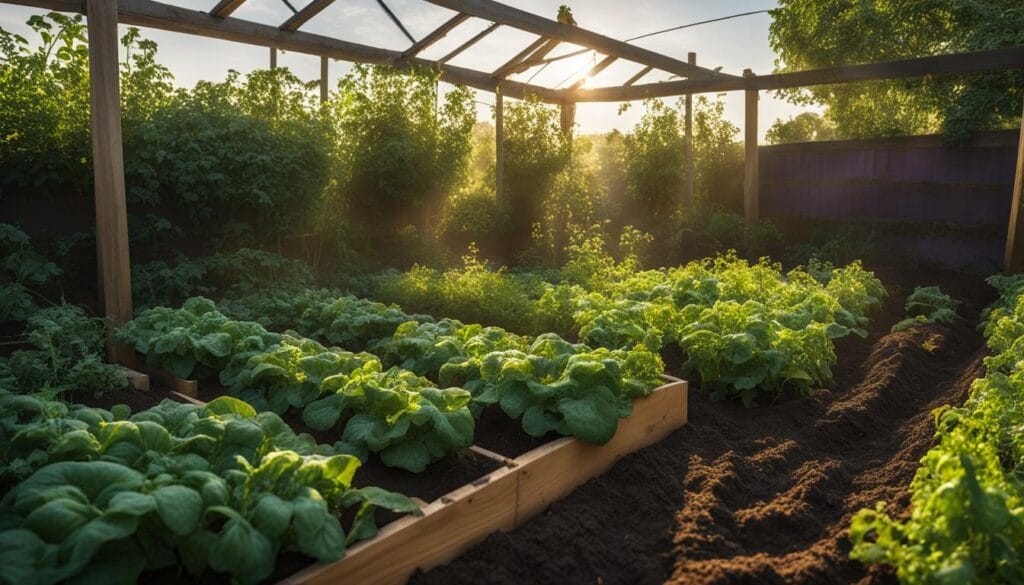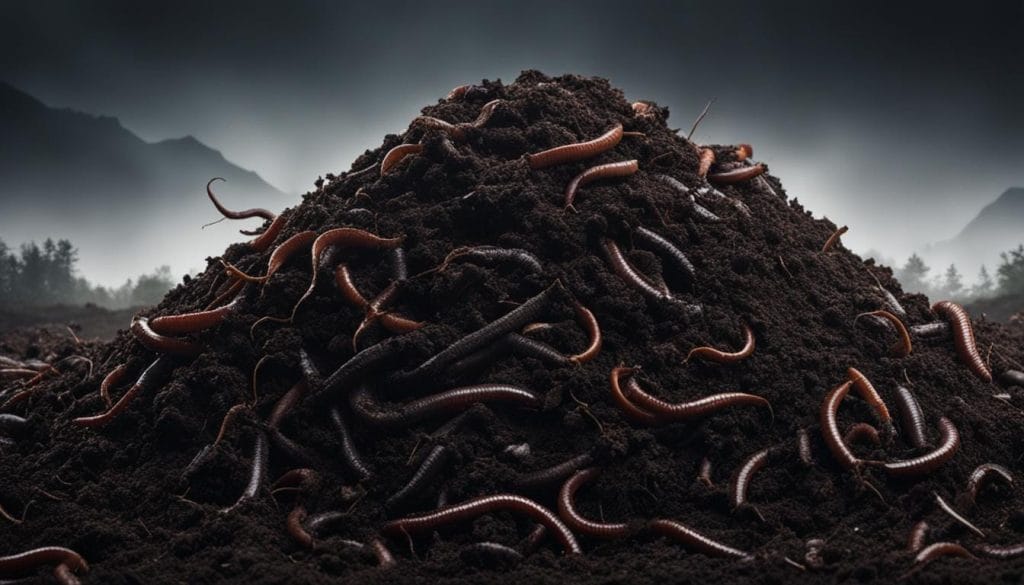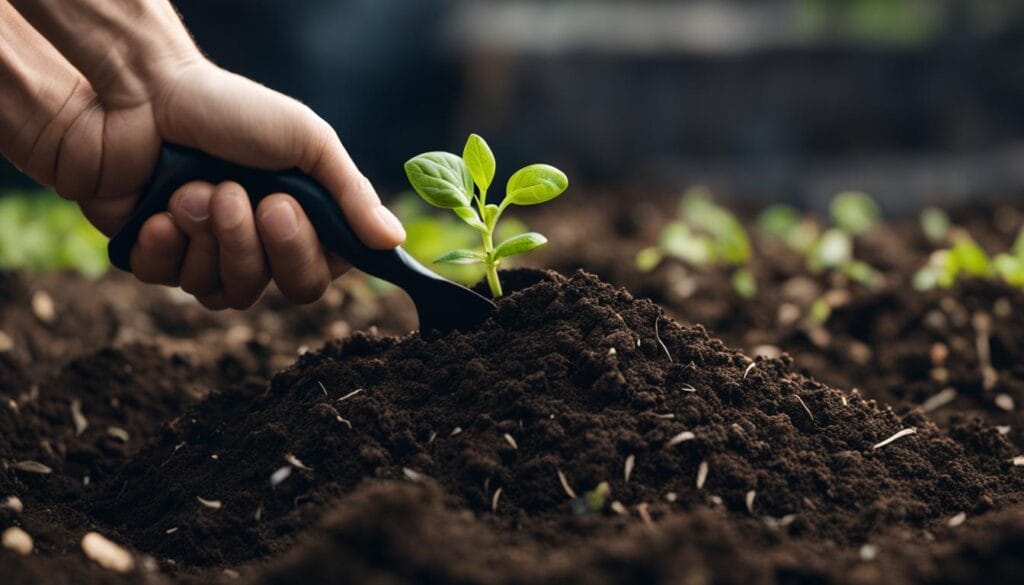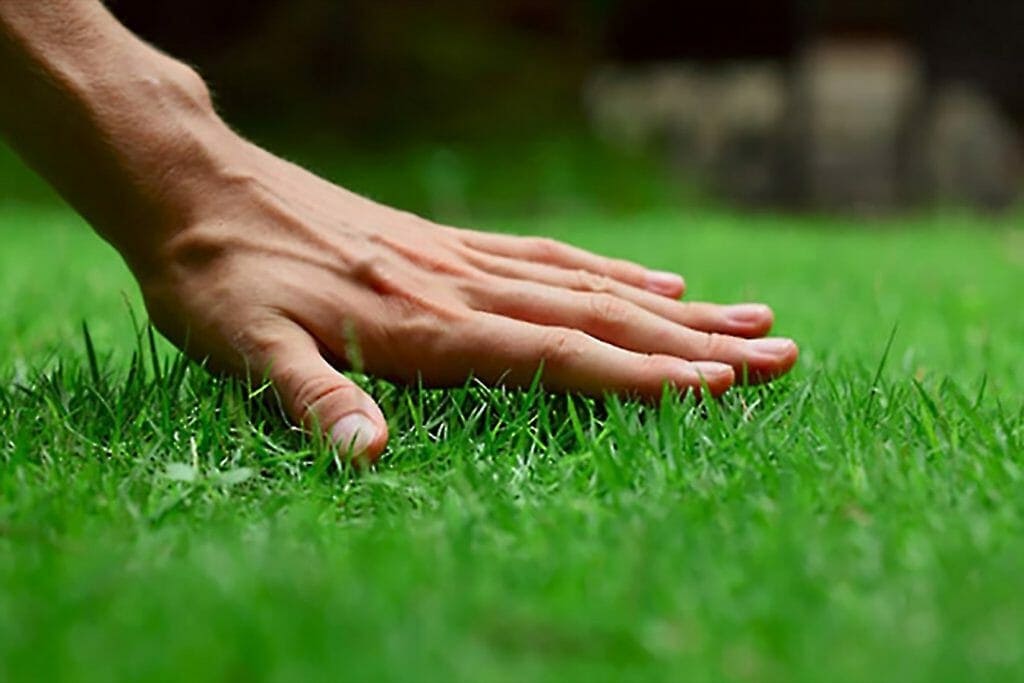Welcome to our guide on DIY soil health for gardeners! As a gardener, you understand the importance of having nutrient-rich soil and healthy plants. By implementing soil improvement techniques and organic gardening tips, you can create an environment that promotes lush greens and thriving gardens all year round.
Whether you’re a seasoned gardener or just starting out, this article will provide valuable insights and practical advice on topics such as DIY composting methods, soil testing for gardeners, natural fertilizer recipes, garden soil amendments, DIY soil conditioner, and improving garden soil structure. By utilizing these strategies, you can enhance the overall health of your plants and achieve gardening success.
Key Takeaways:
- Implement soil improvement techniques and organic gardening tips for healthier plants.
- DIY composting methods and natural fertilizer recipes can enrich your soil with essential nutrients.
- Conduct soil testing to understand your soil’s specific needs and make necessary adjustments.
- Utilize garden soil amendments and DIY soil conditioners to improve soil structure and fertility.
- Create a thriving soil ecosystem by harnessing the power of soil life and earthworms.
Understanding Soil Quality and Why it Should Be Improved
Soil quality plays a critical role in the overall health and productivity of your plants. Understanding the composition of soil and its importance allows you to take the necessary steps to improve its quality. Soil is a complex mixture of minerals, organic matter, water, air, and organisms. By focusing on improving soil composition, you can create an environment that supports healthy plant growth and development.
Organic matter is a key component of soil quality. It provides nutrients for plants, improves soil structure, and enhances water retention. Additionally, organic matter supports the growth of beneficial soil organisms that contribute to nutrient cycling and overall soil fertility. By increasing the organic matter content in your soil, you can create a fertile and conducive environment for healthy plant growth.
“Healthy soil is the foundation for healthy plants. By improving soil quality, you are giving your plants the best possible chance to thrive.” – Expert Gardener
Soil organisms, such as earthworms and bacteria, also play a crucial role in improving soil quality. They break down organic matter, releasing essential nutrients for plant uptake. These organisms also contribute to soil aeration and drainage, facilitating root growth and nutrient absorption. By promoting a diverse and thriving soil ecosystem, you can enhance the overall quality of your soil, leading to healthier and more productive plants.
| Soil Quality Indicators | Importance |
|---|---|
| Organic Matter Content | Affects nutrient availability and water retention |
| Soil pH | Influences nutrient availability and microbial activity |
| Soil Texture | Affects water infiltration and root growth |
| Soil Structure | Determines soil aeration, drainage, and root penetration |
| Soil Fertility | Indicates nutrient availability for plant uptake |
Improving soil quality requires a holistic approach that involves incorporating organic matter, optimizing soil pH levels, and fostering a healthy soil ecosystem. By focusing on these aspects, you can create an environment that promotes healthy plant growth, improves nutrient availability, and minimizes the risk of pests and diseases.

Key Takeaways:
- Understanding soil composition and its importance is crucial for improving soil quality.
- Organic matter enhances soil fertility, water retention, and provides nutrients for plants.
- Soil organisms contribute to nutrient cycling, aeration, and drainage.
- Improving soil quality involves incorporating organic matter, optimizing soil pH, and fostering a healthy soil ecosystem.
Adding Organic Matter to Enhance Soil Quality
Organic matter is a key component in improving soil quality and promoting healthy plant growth. It plays a crucial role in enhancing soil fertility, retaining moisture, providing essential nutrients, and creating a favorable environment for beneficial soil organisms. There are several effective methods for incorporating organic matter into your garden soil.
Composting:
One of the most popular methods is composting. Composting involves collecting organic waste materials such as kitchen scraps, yard trimmings, and leaves, and allowing them to decompose over time. This process results in nutrient-rich compost that can be added to your garden soil as a natural fertilizer. Composting not only improves soil fertility but also reduces waste and promotes sustainability.
Manure:
Another way to enhance soil organic matter is by incorporating manure. Animal manure, such as cow, horse, or chicken manure, is rich in nutrients and beneficial microorganisms. It can be applied directly to the soil or mixed with compost to provide a nutrient boost. When using manure, make sure it is well-aged or composted to avoid burning your plants with excessive nitrogen.
Green Manure Crops:
Growing green manure crops is another effective method to add organic matter to your soil. These are fast-growing plants that are specifically grown to be turned under or incorporated into the soil. Examples of green manure crops include legumes like clover or vetch, which fix nitrogen in the soil, and rye or buckwheat, which help improve soil structure. These crops not only enrich the soil but also suppress weeds and prevent erosion.
Organic Mulches:
Lastly, using organic mulches such as straw, wood chips, or shredded leaves can help improve soil quality. Mulching not only conserves moisture and regulates soil temperature but also breaks down over time, adding organic matter to the soil. As the mulch decomposes, it provides nutrients and promotes the growth of beneficial microorganisms.
| Organic Matter Source | Benefits |
|---|---|
| Compost | Improves soil fertility |
| Manure | Rich in nutrients and microorganisms |
| Green Manure Crops | Add organic matter and improve soil structure |
| Organic Mulches | Conserves moisture and adds nutrients |
By incorporating these organic matter sources into your soil, you can boost soil fertility, enhance moisture retention, improve nutrient availability, and promote the overall health of your plants. Remember to apply organic matter regularly and in appropriate amounts to maintain a balanced and thriving garden soil.

Balancing Soil Nutrients and pH Levels
Properly balanced soil nutrients and pH levels are essential for maintaining healthy plants in your garden. Soil nutrients, such as nitrogen, phosphorus, and potassium, are crucial for plant growth and development. Without the right balance of nutrients, your plants may suffer from nutrient deficiencies, stunted growth, and decreased productivity. Additionally, soil pH affects nutrient availability, as certain nutrients are more readily absorbed by plants when the pH is within the optimal range.
To ensure your soil has the right balance of nutrients and pH levels, it is important to conduct regular soil testing. This will help identify any nutrient deficiencies or imbalances and allow you to make informed decisions regarding fertilization. Organic-based fertilizers are an excellent choice for providing essential nutrients to your plants while also improving soil health. These fertilizers are derived from natural sources and provide a slow-release of nutrients, promoting sustainable growth and minimizing the risk of nutrient leaching.
In addition to fertilization, correcting soil pH is another critical aspect of balancing soil nutrients. Soil acidifiers, such as elemental sulfur or liquid sulfur, can be used to lower soil pH levels for plants that prefer acidic conditions. On the other hand, if your soil is too acidic, the addition of lime can raise the pH and make it more suitable for alkaline-loving plants. It is important to follow the recommended application rates and guidelines when using soil amendments to avoid overcorrecting the pH.
| Soil Nutrient | Function | Deficiency Symptoms |
|---|---|---|
| Nitrogen (N) | Essential for leaf and stem growth | Yellowing of leaves, stunted growth |
| Phosphorus (P) | Promotes root development and flowering | Poor root growth, delayed flowering |
| Potassium (K) | Aids in overall plant health and disease resistance | Weak stems, leaf scorching |
“Maintaining the right balance of soil nutrients and pH levels is crucial for growing healthy and productive plants in your garden.”
By regularly testing your soil, using organic-based fertilizers, and correcting soil pH imbalances, you can ensure that your plants have access to the essential nutrients they need for optimal growth. Remember to follow the specific recommendations for your plant species, as different plants have varying nutrient requirements and pH preferences. With a well-balanced soil nutrient profile and pH level, you’ll be well on your way to cultivating a thriving and bountiful garden.
Ensuring Optimal Soil Moisture and Aeration
When it comes to gardening, maintaining proper soil moisture and aeration is crucial for the health and growth of your plants. Adequate soil moisture ensures that your plants receive the water they need, while proper aeration promotes the flow of air, water, and nutrients within the soil. In this section, we will explore some practical tips to help you achieve optimal soil moisture and aeration in your garden.
Improving Soil Drainage
Poor soil drainage can lead to waterlogged soil, which can suffocate the roots of your plants and promote the growth of harmful fungi and bacteria. To improve soil drainage, consider the following techniques:
- Adding organic matter: Incorporating organic matter such as compost or well-rotted manure can improve soil structure, allowing water to drain more effectively.
- Creating raised beds: Raised beds provide better drainage by ensuring that excess water can flow away from the plant roots.
- Installing drainage systems: If you have particularly heavy or clayey soil, installing drainage systems such as French drains can help facilitate the removal of excess water.
Using Soil Wetters
Soil wetters, also known as surfactants, are products that help water penetrate more evenly into the soil. They prevent water from pooling on the surface and encourage it to spread uniformly throughout the root zone, ensuring that your plants receive sufficient moisture. You can find soil wetters in liquid or granular form, and they are easy to apply according to the instructions provided by the manufacturer.
Incorporating Organic Matter
Organic matter not only improves soil drainage but also helps retain moisture in the soil. It acts as a sponge, absorbing excess water during wet periods and releasing it slowly during dry spells. Adding compost, leaf litter, or well-rotted manure to your soil can increase its organic matter content, improving both moisture retention and drainage.
| Signs of Poor Soil Moisture and Aeration | Signs of Optimal Soil Moisture and Aeration |
|---|---|
| – Wilting plants | – Lush and healthy plants |
| – Waterlogged soil | – Well-drained soil |
| – Foul smell in the soil | – Fresh smelling soil |
| – Stunted growth | – Vigorous growth |
By ensuring optimal soil moisture and aeration, you can provide your plants with the ideal growing conditions they need to thrive. Remember to improve soil drainage, consider using soil wetters, and incorporate organic matter into your gardening practices. These simple yet effective strategies will contribute to healthier, more productive plants in your garden.
Harnessing the Power of Soil Life and Earthworms
Soil life and earthworms are integral to the health and fertility of your garden soil. These tiny organisms play a crucial role in organic matter decomposition, nutrient cycling, and overall soil fertility. By creating a conducive environment for soil life to thrive, you can enhance the productivity and vitality of your garden.
Earthworms are particularly beneficial to the soil ecosystem. They burrow through the soil, breaking up compacted layers and improving soil structure. Their castings, also known as worm castings, are rich in organic matter and nutrients, making them an excellent natural fertilizer for your plants. Encouraging earthworm populations in your garden is as simple as providing them with a healthy habitat. Avoid using chemical fertilizers and pesticides that could harm earthworms, and ensure that your soil has sufficient organic matter for them to feed on.
“Earthworms are nature’s gardeners. They work tirelessly to improve soil structure and fertility, allowing plants to thrive.” – Organic Gardening Expert
In addition to earthworms, there are many other soil organisms that contribute to the overall health of your soil. These microscopic organisms, including bacteria, fungi, nematodes, and protozoa, play vital roles in decomposing organic matter, breaking down nutrients, and creating a balanced soil ecosystem. By nurturing these soil organisms, you are creating a thriving and self-sustaining soil ecosystem that benefits your plants.
Table: Benefits of Soil Life and Earthworms
| Benefit | Description |
|---|---|
| Organic Matter Decomposition | Soil organisms break down organic matter, releasing essential nutrients for plant uptake. |
| Nutrient Cycling | Soil life helps recycle and redistribute nutrients, ensuring their availability to plants. |
| Improved Soil Structure | Earthworms and soil organisms enhance soil aeration, drainage, and structure. |
| Enhanced Soil Fertility | The activities of soil life contribute to the overall fertility and health of the soil. |
To harness the power of soil life and earthworms, incorporate organic matter into your soil regularly. This can be done by adding compost, using cover crops, or mulching with organic materials. Avoid over-tilling your soil, as it disrupts the delicate balance of soil organisms. Instead, practice minimal disturbance methods like no-till gardening or gentle hand-turning of the soil. By creating a favorable environment for soil life and earthworms, you are not only improving the health of your soil but also cultivating an ecosystem that sustains itself over time.
Conclusion
Improving soil health is crucial for successful gardening. By implementing DIY soil health techniques, you can create nutrient-rich soil, promote healthy plant growth, and ensure the longevity of your garden. By following the tips and strategies provided in this article, you can take your organic gardening to the next level.
Adding organic matter to your soil is a great way to enhance its quality. Composting, incorporating manure, growing green manure crops, and using organic mulches are effective methods to increase soil fertility and provide essential nutrients for your plants.
Don’t forget to balance soil nutrients and pH levels. Use organic-based fertilizers that are tailored to your plants’ needs and regularly conduct soil testing to address any deficiencies or imbalances. This will ensure that your plants have the optimal conditions for growth and productivity.
Lastly, pay attention to soil moisture and aeration. Adequate soil moisture and proper aeration are vital for plant health. Improve soil drainage, use soil wetters, and incorporate organic matter to maintain optimal moisture levels and promote well-aerated soil.
By implementing these DIY soil health strategies, you can create nutrient-rich soil, foster organic gardening practices, and enjoy the benefits of healthy and thriving plants in your garden.
FAQ
What is soil quality and why should it be improved?
Soil quality refers to the health and fertility of the soil. Improving soil quality is crucial for promoting healthy plant growth and minimizing pests and diseases.
How can I add organic matter to enhance soil quality?
You can add organic matter to your soil through various methods, such as composting, incorporating manure, growing green manure crops, and using organic mulches.
Why is balancing soil nutrients and pH levels important?
Properly balanced soil nutrients and pH levels are crucial for plant growth and productivity. They can be achieved by using organic-based fertilizers tailored to your plants’ needs and conducting regular soil testing.
How can I ensure optimal soil moisture and aeration?
You can maintain optimal soil moisture levels by ensuring proper drainage, using soil wetters, and incorporating organic matter. Additionally, aerating the soil helps alleviate soil compaction and promotes the movement of air, water, and nutrients within the soil.
What is the significance of soil life and earthworms?
Soil life, including earthworms and various soil organisms, plays a crucial role in soil health and fertility. These organisms break down organic matter, enhance nutrient availability, and improve soil structure.
How can I improve soil health for my garden?
By implementing DIY soil health techniques, such as adding organic matter, balancing soil nutrients, optimizing soil moisture and aeration, and harnessing the power of soil life and earthworms, you can create nutrient-rich soil, promote healthy plant growth, and reduce the risk of pests and diseases.



